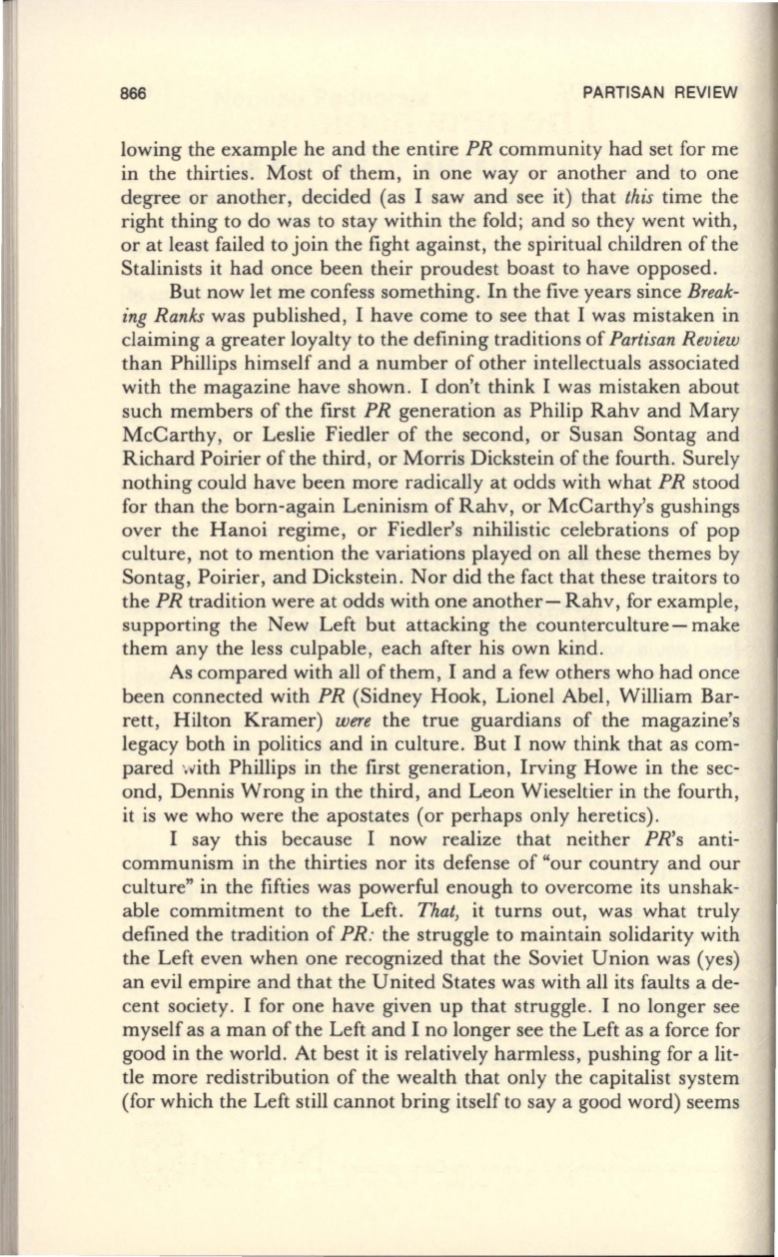
866
PARTISAN REVIEW
lowing the example he and the entire
PR
community had set for me
in the thirties. Most of them, in one way or another and to one
degree or another, decided (as I saw and see it) that
this
time the
right thing to do was to stay within the fold; and so they went with,
or at least failed to join the fight against, the spiritual children of the
Stalinists it had once been their proudest boast to have opposed.
But now let me confess something. In the five years since
Break–
ing Ranks
was published, I have come to see that I was mistaken in
claiming a greater loyalty to the defining traditions of
Partisan Review
than Phillips himself and a number of other intellectuals associated
with the magazine have shown. I don't think I was mistaken about
such members of the first
PR
generation as Philip Rahv and Mary
McCarthy, or Leslie Fiedler of the second, or Susan Sontag and
Richard Poirier of the third, or Morris Dickstein of the fourth. Surely
nothing could have been more radically at odds with what
PR
stood
for than the born-again Leninism of Rahv, or McCarthy's gushings
over the Hanoi regime, or Fiedler's nihilistic celebrations of pop
culture, not to mention the variations played on all these themes by
Sontag, Poirier, and Dickstein. Nor did the fact that these traitors to
the
PR
tradition were at odds with one another- Rahv, for example,
supporting the New Left but attacking the counterculture- make
them any the less culpable, each after his own kind.
As compared with all of them, I and a few others who had once
been connected with
PR
(Sidney Hook, Lionel Abel, William Bar–
rett, Hilton Kramer)
were
the true guardians of the magazine's
legacy both in politics and in culture. But I now think that as com–
pared ·.,rith Phillips in the first generation, Irving Howe in the sec–
ond, Dennis Wrong in the third, and Leon Wieseltier in the fourth,
it is we who were the apostates (or perhaps only heretics).
I say this because I now realize that neither
PR's
anti–
communism in the thirties nor its defense of "our country and our
culture" in the fifties was powerful enough to overcome its unshak–
able commitment to the Left.
That,
it turns out, was what truly
defined the tradition of
PR:
the struggle to maintain solidarity with
the Left even when one recognized that the Soviet Union was (yes)
an evil empire and that the United States was with all its faults a de–
cent society. I for one have given up that struggle. I no longer see
myself as a man of the Left and I no longer see the Left as a force for
good in the world. At best it is relatively harmless, pushing for a lit–
tle more redistribution of the wealth that only the capitalist system
(for which the Left still cannot bring itself to say a good word) seems


